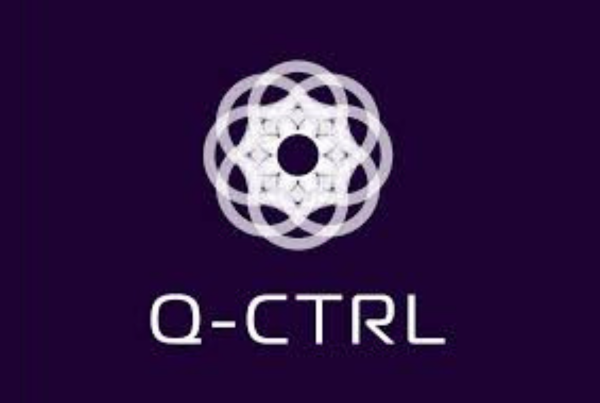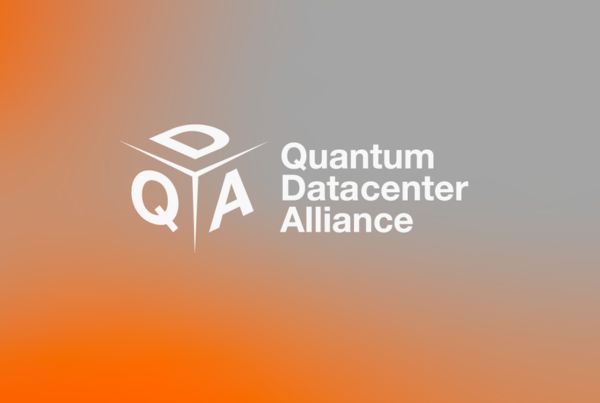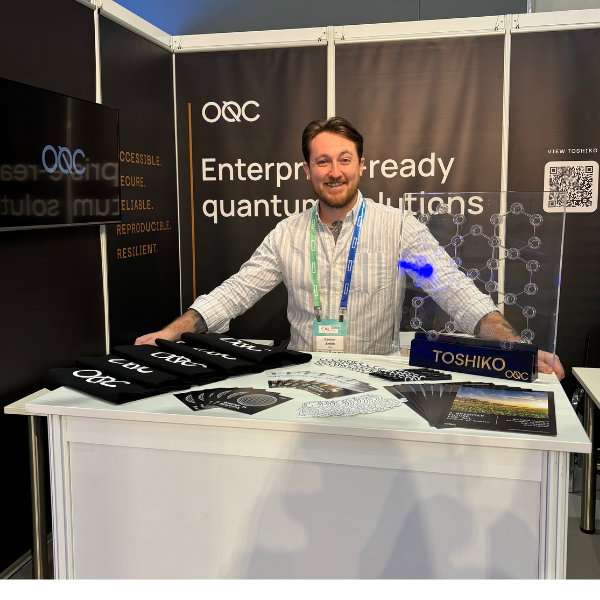
QUICKBITS
The Quantum-Classical Computing Paradigm

Connor Smith
QUANTUM TOOLS TEAM MANAGER
Connor is the Quantum Tools Team Manager at OQC. He manages the development of OQC’s internal software tooling solutions for the quantum hardware and R&D teams, with a heavy focus on the design, simulation and fabrication of OQC’s quantum devices. Connor has a passion for full-stack development, with a particular interest in computer science, genetic algorithms and machine learning. In his spare time, he channels these interests into exploring the creative aspects of design and human-computer interaction, amongst other creative endeavours.
OQC headed to Hamburg last month to attend The ISC High Performance 2024 conference and exhibition, an annual global gathering for HPC technology providers and users. Our Quantum Tools Team Manager, Connor Smith, and Junior Marketing Specialist, Anna Harrington, were on stand to network with over 3,000 international attendees to exchange ideas and knowledge on reinventing HPC. In this article, Connor explores the conference theme of reinventing HPC and how HPC and quantum can support each other in the quest for maximum computational power.
Why ‘reinventing HPC’?
High Performance Computing (HPC) has come a long way, but there is an innate need for a new generation of numerical algorithms that consider core processors, data movement, energy consumption and more, to meet the demands of applications as supercomputing continues to develop. Not to mention, as Moore’s Law slows down and semiconductor fabrication costs rise, HPC is at a critical juncture. The ISC committee also aptly flagged that cloud hyperscalers are increasingly dominating computing economics by utilising custom semiconductors. Yet, HPC remains the core engine for enabling machine learning applications with ever-rising performance requirements.
“We have reached the exascale milestone and now we find ourselves at a crossroad. My vision for the ISC 2024 conference is to engage the ISC community to propose a bold roadmap to reinvent HPC.”
Michela Taufer, ISC 2024 Program Chair
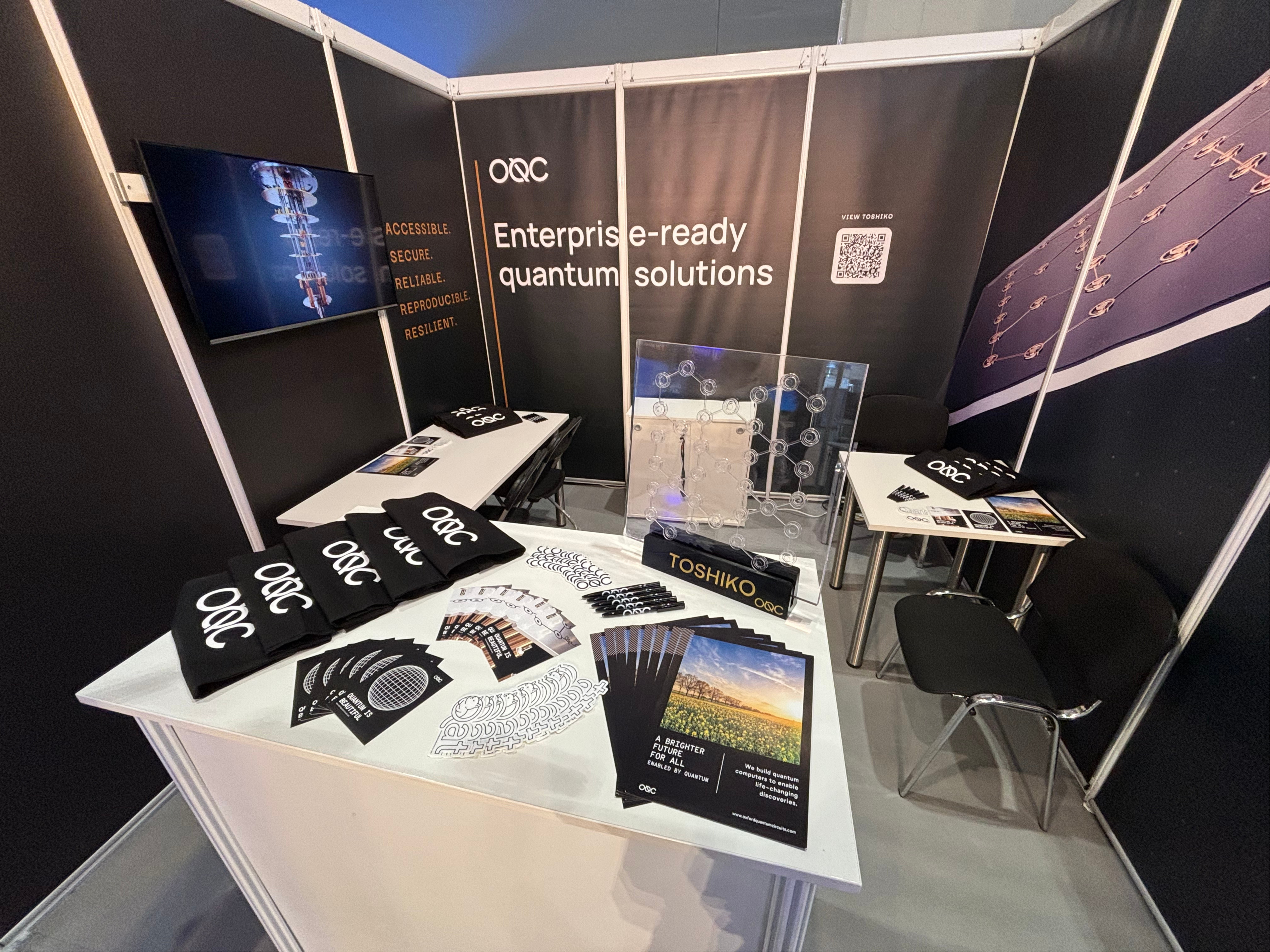
The quantum-classical paradigm
As a part of the OQC software team working in Quantum Tools, I’m repeatedly seeing the importance of utilising the capabilities and knowledge of classical HPC in enabling us to unlock quantum capabilities: quantum-classical computing offers a promising avenue due to its ability to process vast amounts of data in parallel. The integration of HPC and quantum computing promises the acceleration in our generation’s and future generation’s capabilities to solve some of the world’s greatest computational challenges that are either too complex, in computational steps or memory requirements, for HPC alone.
Interestingly, this shift in realising quantum-classical capabilities has led to the rise in demand for hybrid algorithms which are required to leverage the computational power of both the classical and quantum resources. These algorithms allow the quantum chips to handle the computationally intensive core calculations while the classical system completes processing tasks. Correct software infrastructure is not just necessary, but important to support such algorithms; and ensuring smooth allocation of workflow between classical and quantum computations is becoming a key part of ensuring quantum computing is HPC-ready.
When speaking with our hardware experts, it became increasingly clear that unlocking the potential of classical-quantum computing will ultimately bring many positives to industries trying to solve large problems requiring high levels of computational power. High-end HPC resources typically consume large amounts of energy, while quantum computers consume relatively low amounts by comparison, meaning that energy consumption, and therefore costs, can be reduced by offloading computation to quantum processors. Our team provides some detail on this in a recent whitepaper. The integration of quantum and HPC also means that we can run classical algorithms and quantum algorithms simultaneously, leading to a significant acceleration in computing speed. If both the classical and quantum hardware is within the same data centre, there are further benefits of lower latency, high security and protection of intellectual property. Through a hybrid approach we can leverage the strength of both technologies and achieve maximum computational power, working towards a future where both platforms will support each other.
Networking and insights from ISC 2024
As an ISC 2024 exhibitor, I connected with HPC enthusiasts and spoke with public and commercial users of HPC searching for products and solutions. It was exciting to see such a quantum presence at ISC this year, and to hear about the collaborations between HPC and quantum computer providers, working together to unlock quantum capabilities. If we rewind just 2 years, Stefano Mena notes from ISC 2022 that there was a ‘noticeable shift towards the exploration of quantum computing’ and its applications, also mentioning a commitment made by the HPC community to reduce the environmental impact of HPC by exploring new solutions for reduced chip power consumption, cooling HPC systems more effectively and developing energy-efficient workload scheduling.
At the time,very few facilities worldwide had access to actual quantum computers on premise with the majority of scientific communities accessing quantum hardware via cloud interfaces. The vision was to start to seamlessly integrate quantum hardware into existing classical resources.
Fast forward to the present day and Stefano Mena was part of ISC’s ‘Quantum Advantage — Where are We and What is Needed?’ panel, where they discussed how ‘Europe has mobilised to rapidly integrate quantum computers into its advanced HPC centres’. We often see that organisations are actively seeking quantum computers that are not just powerful but that are also capable of integrating with existing HPC infrastructures. I noted that the general consensus across the panel was that in 5 years time they believed we will have a commercially useful quantum advantage.
I also enjoyed hearing about quantum computing hardware and software companies who are successfully integrating with HPC during the ISC exhibition, where it is clear that positive and exciting steps are being made towards the classical-quantum paradigm. A notable topic of conversation on the ISC exhibition floor was around how we realise the full potential of classic-quantum computing, leading to captivating conversations around use cases and proof of concepts. At OQC, classical-quantum compute capabilities are already being explored in vital use cases, including modelling chaotic systems for precise precipitation forecasting and hybrid classical-quantum federated learning for biomedical machine learning.
As mentioned earlier, experts in the field are predicting that in 5 years time we will have a commercially useful quantum advantage, meaning that now is the time for businesses to get up to speed and gain competency in the field. Rather than a ‘results now’ focus, businesses should be investing in becoming quantum ready, learning how to identify problems, distil these and express them in ways that a quantum computer would be able to solve, with the knowledge that small scale proof of concepts created and tested now, will prove how quantum computing will be a powerful tool for the future.
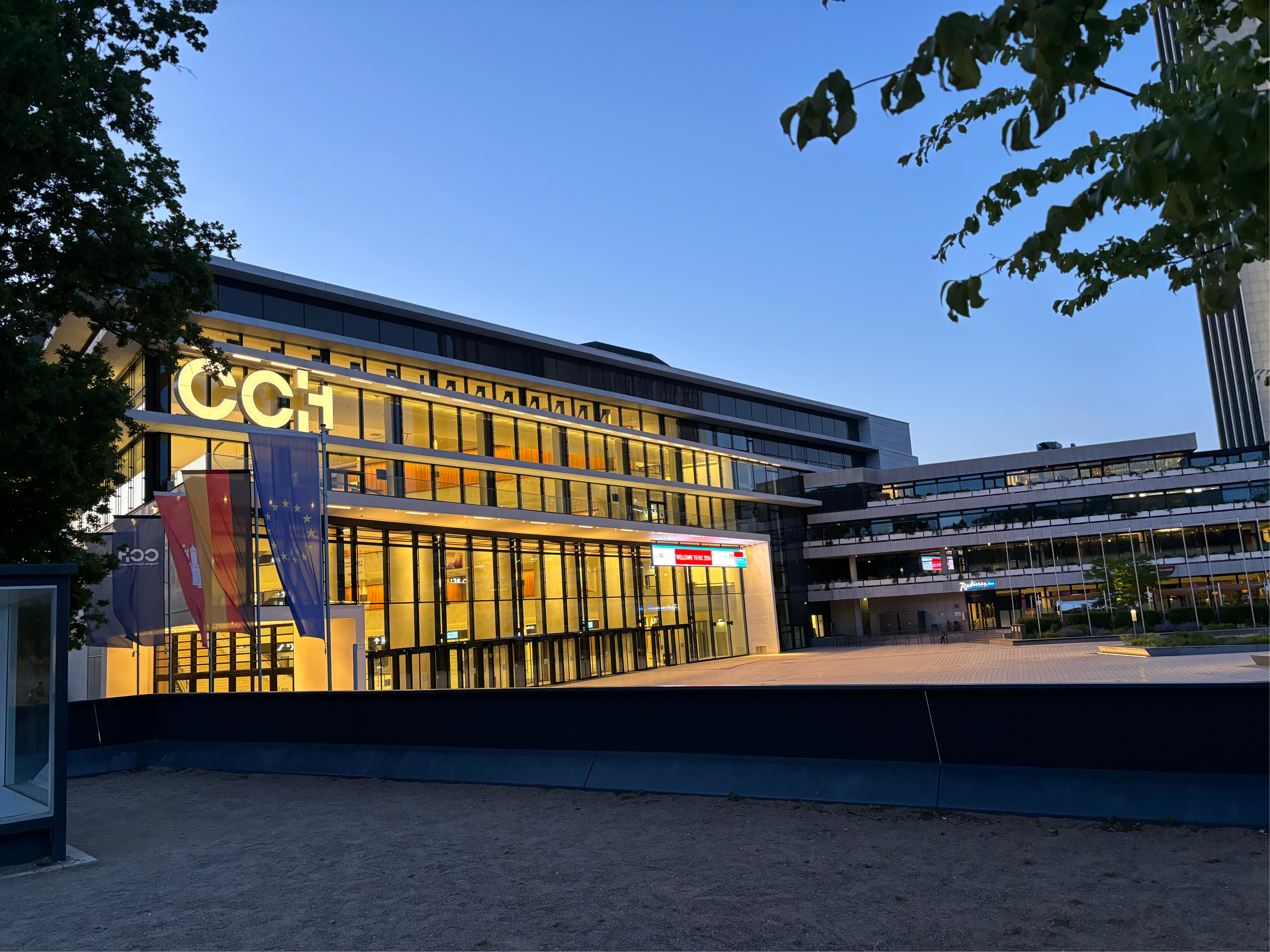
What does ‘re-inventing HPC’ look like for OQC?
As my team and the rest of OQC work towards our mission of putting quantum into the hands of humanity, we quickly recognised that HPC integration is important as it will enable us to expand our offering and reach a wider audience through the use of hybrid workloads. In September of 2022, only 4 months after ISC2022 saw a shift towards the exploration of quantum computing, OQC announced the world’s first integration of a quantum computer into a colocation data centre. This partnership with Centresquare saw our quantum computers moving from a lab into existing data centre infrastructure . To date, we have now also installed our quantum hardware into Equinix’s TY11 Tokyo International Business Exchange™ (IBX®) data centre and delivered a quantum computer to a supercomputing centre in CESGA, Spain. Both of these recent deployments have seen the integration of HPC and the development of hybrid quantum. Integration into the existing infrastructure puts OQC’s quantum computers closer to customers’ data within the existing data centre fabric and supports complete data sovereignty.
At OQC, one of our guiding principles is : “Build the core; partner with the best” and it’s something I particularly engage with as part of the software team. Collaboration is pivotal in the classical-quantum paradigm, and by partnering with existing HPC companies we can look to leverage the power of classical-quantum computing by drawing on the strength of both classical and quantum hardware and software through these key partnerships. As we continue to work towards breaking down barriers to access, we have recently introduced the CLOCQ partnership where we have been able to use NVIDIA CUDA Quantum which supports HPC-enabled scientific discovery and simulation. The CLOCQ partnership also means we are able to work with experts across quantum and classical hardware and software, drawing on industry expertise to work towards a seamlessly integrated solution.
Large businesses, universities and governments who are attempting to tackle the world’s greatest challenges will ultimately benefit from classical-quantum computing, as quantum unlocks computational power that HPC alone cannot. Bringing hybrid compute into data centres means we are able to give customers access to an unparalleled level of compute power through the co-location of our partners GPUs with OQC QPUs. The data centre infrastructure ensures that access to OQC quantum computers is secure, allowing companies to move away from toy data and toy problem sets to using real data, meaning customers have the ability to run hybrid workloads and make a start on their quantum journey and education today. Creating proof-of-concepts will ultimately ensure that these sectors are quantum ready when the time comes, by building internal expertise and maintaining their competitive edge in their fields.
ISC 2024 and the future
The integration of HPC with quantum computing promises an exciting road ahead and a journey I am looking forward to progressing on, particularly as we’re beginning to see funding from Governments across Europe that could ensure we see further acceleration in the quantum computing industry and with HPC-quantum integrations. After attending ISC2024 it was incredibly interesting to note that it has been a breakout year for quantum with a notable increase in quantum sessions compared to previous years – I hope to see this trajectory continue in the future as we continue to build and strengthen HPC-quantum partnerships. It feels that now is the time to fully embrace the collaborative spirit of innovation and continue to bring together the wide range of experts across quantum and HPC to continue to move towards the age of quantum advantage. I am looking forward to seeing what progress has been made next year at ISC 2025!
Join our newsletter for more articles like this
By clicking ‘sign up’ you’re confirming that you agree with our Terms & Conditions

